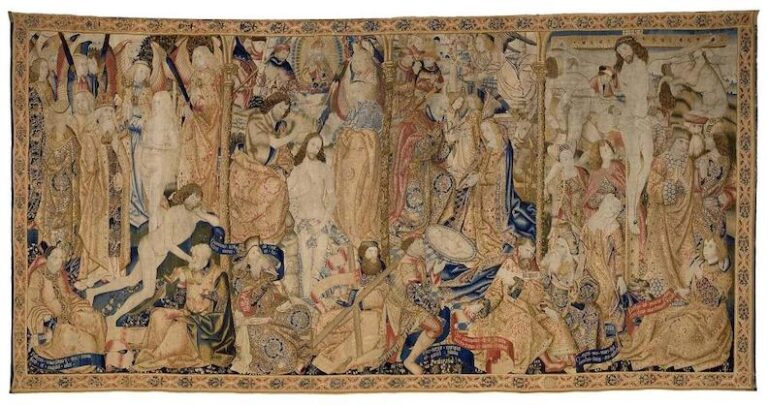
Published March 23, 2023
We believe in one, holy, catholic, and apostolic Church. This is a truth we profess every time we recite the Creed. Given the obvious divisions among Christian Churches and denominations, and even within the Catholic Church, it’s worth pondering: In what does this oneness consist?
The simplest answer is that the Church is one by virtue of our one baptism, and the one Christ into whom we are baptized. We profess one faith, in communion with the bishops in unbroken succession to the apostles, and these with and under the successor of Peter, the bishop of Rome.
Ultimately, the unity of the Church is the unity of Christ Himself. For this reason, division in the Church is always a wound in the Body of Christ. From this comes the urgent imperative for the work of genuine ecumenism, so emphasized at the Second Vatican Council and by Pope John Paul II in his 1995 encyclical, Ut unum sint (“That they may be one”), in which he insisted: “To believe in Christ means to desire unity; to desire unity means to desire the Church; to desire the Church means to desire the communion of grace which corresponds to the Father’s plan from all eternity.”
We are not the primary agents of the Church’s unity; God is. But we can cooperate, or not, in strengthening and preserving that unity. Separating ourselves from our bishops, from Peter, or from the faith received through the Tradition all damage our unity. Consider Paul’s admonitions to the Corinthians, in which he attributes rivalry among them to their “being of the flesh.” Sin and worldliness are not only occasions of personal guilt but are concrete causes of division within the Body of Christ.
It has always been this way, as we read in the Letter to the Hebrews:
Remember your leaders who spoke the word of God to you. Consider the outcome of their way of life and imitate their faith. Jesus Christ is the same yesterday, today, and forever. Do not be carried away by all kinds of strange teachings . . . (13:7-9)
The credibility of the Church’s witness is diminished when unity is lacking, not just across space – from one diocese to another – but across time. As though the Gospel of today is a different Gospel than yesterday; as though the Spirit animating the Church today were a different Spirit than the one animating her last century, or in the last millennium, or at Pentecost itself. The Spirit that hovered over the waters of creation is the same Holy Spirit that animates the Church today.
These days, the idea of the development of doctrine is often reduced to a species of casuistry, a means for justifying any manner of deviations from what has been handed down to us. Development of doctrine is a corollary to the profound unity of the faith across time and space. Authentic doctrinal development is not a technique for manipulating Tradition, a means for bending Tradition to our purposes or to the world’s.
But we are not masters of the Word of God. Not even the bishops are. The Second Vatican Council made this perfectly clear when it declared, in Dei Verbum:
[T]he task of authentically interpreting the word of God, whether written or handed on, has been entrusted exclusively to the living teaching office of the Church, whose authority is exercised in the name of Jesus Christ. This teaching office is not above the word of God, but serves it, teaching only what has been handed on, listening to it devoutly, guarding it scrupulously and explaining it faithfully in accord with a divine commission and with the help of the Holy Spirit, it draws from this one deposit of faith everything which it presents for belief as divinely revealed. (Emphasis added.)
This cannot be repeated often enough: The teaching office of the Church, exercised in the name of Jesus Christ, is not above the word of God, whether written or handed on – that is, as concerns both Scripture and Tradition! – but rather serves it. The unity of the Church is not extraneous to the revealed word of God as found in the Scriptures and Tradition but is utterly inseparable from it.
Remaining faithful to what we have received is more than a matter of intellectual assent. Unity with Christ manifests itself in charity. The faith itself, lived within the concrete circumstances of our own day, represents a very real and concrete guarantor of ecclesial unity across space and time. The Body of Christ, the People of God, includes that great host of witnesses who have come before us; those who have, as St. Paul says, competed well, finished the race, and kept the faith.
Pope Paul VI extends this point in Evangelii Nuntiandi. The Church must preserve her inheritance, but it is never enough simply to possess the Good News. The Church must also share it. And that requires the wisdom to understand those with whom we would share it:
[I]t is absolutely necessary for us to take into account a heritage of faith that the Church has the duty of preserving in its untouchable purity, and of presenting it to the people of our time, in a way that is as understandable and persuasive as possible. This fidelity both to a message whose servants we are and to the people to whom we must transmit it living and intact is the central axis of evangelization.
And here, as they say, is where the rubber meets the road. The Church is bound to protect and defend the Truth of which she is custodian. Her unity depends upon and shines forth in this. But it is also true that, precisely on account of this treasure she possesses, that the Church must bear witness to the Good News in ways that are compelling, not so much to ourselves as to those with whom we would share the Good News.
Unity in the Church, like evangelization, must be built on both truth and love.
Stephen P. White is a fellow in the Catholic Studies Program at the Ethics and Public Policy Center. Mr. White’s work focuses on the application of Catholic social teaching to a broad spectrum of contemporary political and cultural issues. He is the author of Red, White, Blue, and Catholic (Liguori Publications, 2016).
Stephen P. White is a fellow in the Catholic Studies Program at the Ethics and Public Policy Center. Mr. White’s work focuses on the application of Catholic social teaching to a broad spectrum of contemporary political and cultural issues. He is the author of Red, White, Blue, and Catholic (Liguori Publications, 2016).











